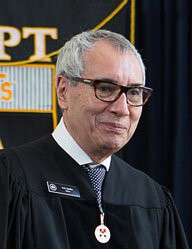
Luis Aguilar-Villanueva
Citation
Written by Fr. Michael Sweeney, OP, on May 2014 at the Induction in the College of Fellows
Luis Aguilar-Villanueva, the Dominican School of Philosophy and Theology salutes you.
In his Apostolic Exhortation Evangelii Gaudium, Pope Francis made this petition:
I ask God to give us more politicians capable of sincere and effective dialogue aimed at healing the deepest roots – and not simply the appearances – of the evils in our world! Politics, though often denigrated, remains a lofty vocation and one of the highest forms of charity, inasmuch as it seeks the common good. We need to be convinced that charity “is the principle not only of micro-relationships (with friends, with family members or within small groups) but also of macro-relationships (social, economic and political ones) (205).
Throughout your distinguished career you have exercised this form of charity by assisting politicians and, with them, public servants at every level of government to understand governance and to effect social leadership for the sake of the common good.
Having completed your doctoral studies in political philosophy at the Gregorian University in Rome and at the Eberhard Karls University, Tübingen, Germany you then served as professor at the National Autonomous University of Mexico, The College of Mexico, The Autonomous Metropolitan University and, as guest Professor, at the College of the Northern Border. You founded and directed the Research Institute on Public Policy and Governance at the University of Guadalajara, Mexico.
Author of eleven books and many dozens of articles and book chapters, you are widely recognized as the foremost authority on governance in the Spanish-speaking academic world. You have been responsible for introducing the discipline of public policy throughout Latin America and in Spain, where you are regularly invited to lecture and participate in conferences and seminars. From 2006 until 2013 you served, first as a member and then as Chair of the Committee of Experts on Public Administration at the United Nations.
In your work on governance you have insisted that economic or administrative efficiency, while necessary, is an insufficient measure of the efficacy of governments. Amidst widespread skepticism concerning the ability of governments to deal with the complex social challenges in contemporary societies you have proposed that governance requires collaboration between the government and subsidiary entities within the state, including private enterprise, economic, civil and religious institutions. You have taught that in many countries the social and moral values of citizens have suffered from an over-emphasis upon positive law with the result that citizens are disillusioned and that such disillusionment endangers social institutions in their foundations.
You have insisted that, because society is multi-centered, political authority must coordinate but not subordinate subsidiary entities. Moreover, a significant function of political leadership is to prepare citizens to engage in public decision-making, most especially those who are least prepared to participate in governance or whose participation has been hindered. Beyond their engagement in the decision-making function of government, citizens must also be enabled to enter into the planning, implementing, monitoring and evaluating of government initiatives, holding public officials accountable. In this manner you have taught a way to realize in practice the principle of subsidiarity, which is, you insist, at the heart of your work.
You have been honored for your accomplishments by the people of Mexico: you are a member of Mexico´s National System of Research and in 2008 you were awarded the Emeritus Researcher distinction. Last year, you became the first Doctor Honoris Causa of the National Institute of Public Administration of Mexico for your contributions to the knowledge of public administration and public governance.
For our part, we are honored that you have accepted our invitation to join with us in our work of engaging contemporary society through the lens of our Dominican educational tradition.
Therefore, as an expression of our esteem and gratitude, and in virtue of the authority invested in me by the Board of Members of the Dominican School of Philosophy and Theology, I am privileged to bestow upon you, Luis Aguilar-Villanueva, the degree Doctor of Humane Lettershonoris causa, and to name you a Fellow of the Dominican School of Philosophy and Theology.
